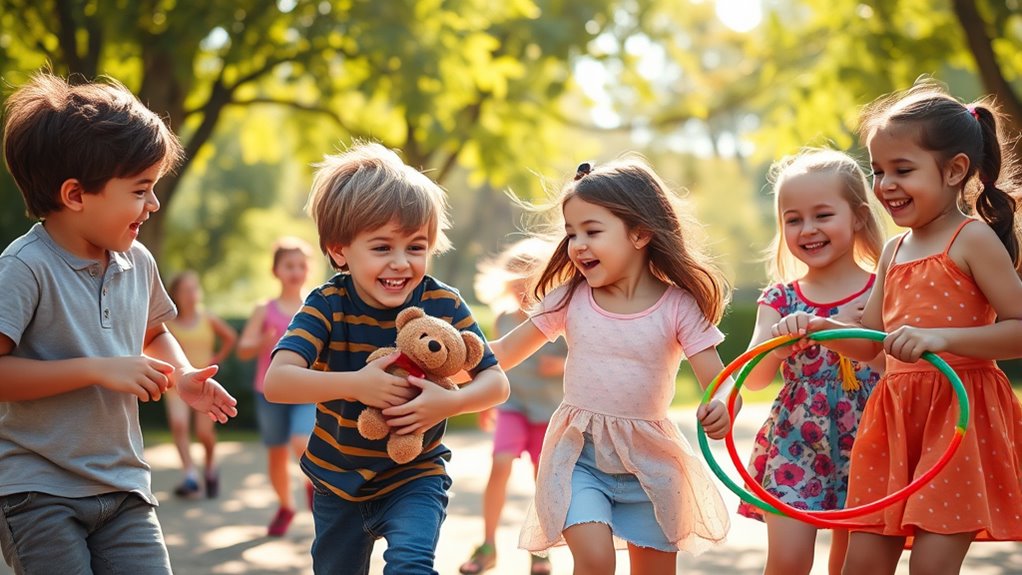To help your child make friends easily, encourage them to join extracurricular activities that match their interests. Organize playdates in familiar spaces where they feel comfortable and can practice social skills without pressure. Teach them simple conversation starters to break the ice, and foster empathy by discussing feelings and encouraging supportive interactions. By consistently creating a supportive environment at home, you can boost their confidence and skill in making lasting friendships. Learn more about effective strategies ahead.
Key Takeaways
- Encourage participation in extracurricular activities that align with your child’s interests to foster natural social connections.
- Organize playdates in familiar, low-pressure settings to help your child practice social skills comfortably.
- Teach your child simple conversation starters to boost confidence and facilitate engagement with peers.
- Foster empathy by discussing feelings and scenarios, helping your child understand and connect with others emotionally.
- Create a supportive environment at home by celebrating social efforts and reinforcing positive behaviors to encourage ongoing social interactions.

Making friends can be a challenge for your child, especially in new environments. To help your child make friends, consider encouraging them to join extracurricular activities that align with their interests. When kids share common interests, it creates natural opportunities to practice social skills. Whether it’s sports, art, or music, these activities provide a comfortable setting for your child to connect with peers. Engaging in mental clarity practices can also enhance their confidence in social interactions. Additionally, emotional intelligence can significantly improve their ability to navigate social situations effectively.
Facilitating regular playdates is another effective way to help your child practice social interactions. Make sure these playdates happen in familiar environments where your child feels at ease. This low-pressure setting reduces anxiety and makes it easier for them to engage with others. During these gatherings, you can model positive social behaviors, such as active listening and empathy. Children often learn by observing their parents, so your own interactions can have a significant impact on their social skills.
Teaching your child conversation starters can further boost their confidence in social situations. Simple phrases like, “What’s your favorite game?” or “Do you like dogs or cats?” can break the ice and help initiate discussions. When your child feels equipped with these tools, they’re more likely to engage with others and build friendships. Reinforcing positive behavior is also important; when you praise your child for demonstrating kindness, cooperation, or effective communication, you’re helping to build their self-esteem.
Encouraging empathy is another fundamental aspect of developing strong social skills. Help your child understand how others might feel in different situations. Discuss scenarios where they can practice empathy, such as comforting a friend who’s upset or sharing toys during playtime. By fostering this emotional intelligence, you’re not only helping them make friends but also teaching them to maintain those friendships over time. Empowering families in navigating these emotional dynamics can be invaluable.
Finally, it’s essential to create an environment where your child feels secure to practice social interactions. Regularly engaging in conversations at home can set the stage for them to feel comfortable talking to others. Celebrate their efforts in social situations, even if they stumble. Reinforcing positive behaviors encourages them to keep trying, which is key to building lasting friendships.
With your support, your child will develop the social skills they need to navigate friendships successfully.
Frequently Asked Questions
What to Do if Your Child Struggles to Make Friends?
If your child struggles to make friends, start by observing their interactions to pinpoint specific challenges, like social anxiety or difficulty sharing.
Encourage them to step out of their comfort zone gradually, helping build their confidence. Teach them social skills such as conversation starters and active listening.
Organize playdates or group activities based on their interests to create relaxed environments.
If issues persist, consider seeking professional guidance to support their social development.
Why Do Some Kids Have a Hard Time Making Friends?
Did you know that about 1 in 10 children experience significant social challenges?
Some kids struggle with making friends due to impulsive or hyperactive behaviors, which can make interactions tough. Others might seem inattentive, causing them to miss social cues.
Difficulties in sharing or taking turns can further limit their peer connections. Additionally, social anxiety can create feelings of isolation, leaving them unsure about how to approach potential friendships.
How to Help Your Child When They Have No Friends?
When your child has no friends, it’s important to take proactive steps.
Start by encouraging them to explore their interests and enroll in activities where they can meet peers.
Create opportunities for playdates in comfortable settings to ease social interactions.
Role-play conversation starters at home to boost their confidence.
Finally, keep an eye on their social environment and address any issues like bullying, ensuring they feel safe and supported.
How to Help a Child Who Is Struggling Socially?
When your child’s struggling socially, it’s essential to encourage open conversations about their feelings and experiences.
Create a safe environment where they can express themselves freely. Help them understand their emotions and those of others, fostering empathy.
Teach positive social behaviors like sharing and taking turns, and arrange playdates or group activities that match their interests.
If challenges persist, don’t hesitate to seek professional guidance to support their social development.
Conclusion
In the grand adventure of childhood, making friends can feel like climbing Mount Everest, but with your support, it doesn’t have to be intimidating! Encourage your child to embrace their unique qualities and explore new activities. Remind them that every friendship starts with a simple hello. By nurturing their confidence and social skills, you’re helping them build a network of friendships that can last a lifetime. So, let them shine, and watch their social circle grow like wildflowers in spring!









